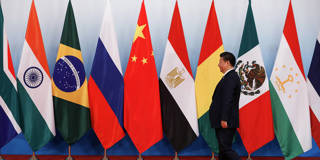Since China, Russia, India, and Brazil held the first BRIC summit in 2009, South Africa has been added to the club, and China's influence on the world stage and within the group has grown immensely. But even as China continues to set the group's agenda, the other BRICS have an important role to play in reforming the global order.
JOHANNESBURG – This week, South Africa is hosting the tenth annual gathering of the BRICS (Brazil, Russia, India, China, and South Africa). When the first BRIC summit was held in 2009 (South Africa was added in 2010), the world was in the throes of a financial crisis of the developed world’s making, and the increasingly dynamic BRIC bloc represented the future. By coming together, these countries had the potential to provide a geopolitical counterweight to the West.
But Western commentators have long underestimated that potential, forcing the BRICS to demand greater representation in global-governance institutions. In 2011 and 2012, the BRICS challenged the process of selecting leaders at the International Monetary Fund and the World Bank. But, lacking a united front behind them, a European (Christine Lagarde) and an American (Jim Yong Kim) continued to preside over those organizations. And though the BRICS did get these institutions to reform their voting structures to give developing countries greater weight, the US and Europe still wield disproportionate power.
Against this backdrop, the BRICS took it upon themselves to pursue “outside options,” by establishing the New Development Bank (NDB) and the Contingent Reserve Arrangement in 2014. These initiatives have been presented as complements to the prevailing Bretton Woods system, but it is easy to see how they could also form the foundation for an alternative global-governance framework at some point in the future.

JOHANNESBURG – This week, South Africa is hosting the tenth annual gathering of the BRICS (Brazil, Russia, India, China, and South Africa). When the first BRIC summit was held in 2009 (South Africa was added in 2010), the world was in the throes of a financial crisis of the developed world’s making, and the increasingly dynamic BRIC bloc represented the future. By coming together, these countries had the potential to provide a geopolitical counterweight to the West.
But Western commentators have long underestimated that potential, forcing the BRICS to demand greater representation in global-governance institutions. In 2011 and 2012, the BRICS challenged the process of selecting leaders at the International Monetary Fund and the World Bank. But, lacking a united front behind them, a European (Christine Lagarde) and an American (Jim Yong Kim) continued to preside over those organizations. And though the BRICS did get these institutions to reform their voting structures to give developing countries greater weight, the US and Europe still wield disproportionate power.
Against this backdrop, the BRICS took it upon themselves to pursue “outside options,” by establishing the New Development Bank (NDB) and the Contingent Reserve Arrangement in 2014. These initiatives have been presented as complements to the prevailing Bretton Woods system, but it is easy to see how they could also form the foundation for an alternative global-governance framework at some point in the future.